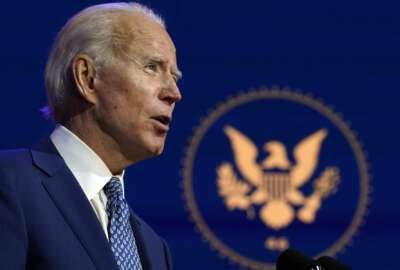
NTEU will push agencies for permanent telework arrangements in post-pandemic world
The National Treasury Employees Union said it will push agencies at the bargaining table, as well as the new administration and Congress through legislation or ...
Best listening experience is on Chrome, Firefox or Safari. Subscribe to Federal Drive’s daily audio interviews on Apple Podcasts or PodcastOne.
Even in a new year — with a new administration and new Congress — the National Treasury Employees Union isn’t quite ready to turn the page on the issues that kept it busy for much of 2020 and, in part, the last four years.
The usual priorities, like pursuing federal employee pay raises and workplace rights, are still on the table.
And the union says there’s still too much to do to recover from the trio of executive orders President Donald Trump signed back in 2018, which President-elect Joe Biden has since promised to repeal.
Plus, the ongoing pandemic has created additional priorities and refocused old ones for NTEU, said Tony Reardon, the union’s national president, in an interview with Federal News Network.
“It involves making telework, which has proven very successful during the pandemic, permanent,” he said in describing NTEU’s new priorities for the new administration. “It involves, when we’re talking about COVID health and safety protocols, specifics like vaccines, personal protective equipment, flexible scheduling and those sorts of things.”
NTEU had worked with several agencies to pursue telework pilots before the pandemic, but it’s taken off over the last 10 months. Now, the union will push both individual agencies and the new administration and Congress to consider broader, more permanent remote work policies.
“There is certainly legislation that could be pursued,” Reardon said. “But the other opportunity, and I think probably one that is most available to us or most in our control, is at the bargaining table. We have contracts coming open all the time and we will continue to pursue that.”
For its part, NTEU has seen agencies adopt new technology, as well as a new mindset about the futility of remote work, since the pandemic began last March. At the IRS, telework has been “extraordinarily successful” during the pandemic, Reardon said.
NTEU represents roughly 70,000 IRS employees. Some have been working remotely for much of the pandemic, but others are working in person at IRS campuses. Reardon said he shared the union’s concerns about the pandemic with IRS Commissioner Chuck Rettig, and both the NTEU and the agency agreed to create COVID-19 teams.
Those teams met daily in the early days of the pandemic, Reardon said.
“We were able to work through, collectively, a lot of issues. We still have those meetings,” he said. “In terms of a formal meeting, those only happen once a week [now], but we’re still able to work together to come up with solutions for all of the issues that confront the agency. We will continue to work with the agency.”
“I think they’ve done a pretty good job,” Reardon said of the IRS. “I’m very pleased that they care about the health of the employees.”
Things haven’t been perfect. Employees still report instances to NTEU where their coworkers aren’t wearing a mask, or individual offices aren’t following social distancing guidelines.
“We’re asking the IRS to do some other things too, to make sure that they provide vaccines to employees who are required to be in the workplace,” Reardon said. “We’re asking them to do testing… and to improve their screening of employees who are going into work.”
The IRS hasn’t yet committed to vaccinating its employees, Reardon said.
The union represents employees with frontline jobs at other agencies, and NTEU is pushing for those organizations to play a greater role in vaccinating their workforces as well.
“[On] this issue of getting vaccines out to employees who are face-to-face with either taxpayers or the traveling public, it is essential that the federal government should be taking care of their employees and providing vaccines for those who have that face-to-face contact,” Reardon said.
Recovery from Trump’s 2018 executive orders
Beyond making telework and COVID-19 protections a more permanent fixture within federal agencies, NTEU is also focused — as are many other unions — on dealing with the aftermath from Trump’s executive orders on employee firings, official time and collective bargaining.
“The executive orders are really a major thing that we confront and have confronted since May 2018,” Reardon said.
NTEU and other federal employee unions are counting on Biden to repeal those EOs within days of him taking office.
But repealing them is only the first step.
“There is additional work that’s going to have to be done,” Reardon said. “[For] our unfair labor practice (ULP) grievances that we have over executive order provisions, they have to be resolved somehow.”
NTEU has several outstanding ULPs with the Environmental Protection Agency and the Department of Health and Human Services, which both imposed new bargaining proposals that the union never agreed to.
“What we’re hoping is that these can be resolved by the agency going back to the table and negotiating in good faith,” Reardon said. “That is something that we’re going to be pushing for, and hopefully it will happen.”
NTEU is also hopeful the Office of Personnel Management, under new leadership, will rescind all guidance and regulations related to those executive orders, as well as prior guidance that effectively paused diversity and inclusion training at most federal agencies.
Overall, NTEU would like to see a new director bring some stability, and influence, back to the agency and the government at large.
“We need an OPM director who is qualified for the job and respects the civil service,” Reardon said. “OPM went through four different directors through President Trump. We want OPM to be involved in cabinet-level discussions. I’m not suggesting that they are in the cabinet, but I am suggesting that they be involved in cabinet-level discussions.”
Copyright © 2024 Federal News Network. All rights reserved. This website is not intended for users located within the European Economic Area.
Nicole Ogrysko is a reporter for Federal News Network focusing on the federal workforce and federal pay and benefits.
Follow @nogryskoWFED





